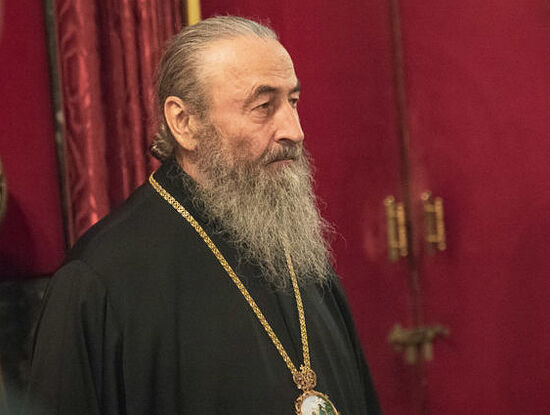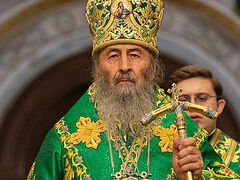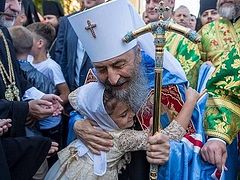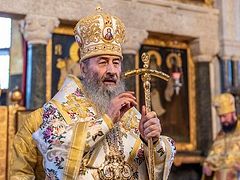The Information-Education Department of the Ukrainian Orthodox Church recently published an interview with His Beatitude Metropolitan Onuphry of Kiev and All Ukraine that first appeared in the latest issue of the “Academic Chronicler” journal of the Kiev theological schools.
—Your Beatitude, how can we learn to love our enemies, and what is true Christian love?
—To love our enemies, we must first love God. What is love of God? It is the fulfillment of the Divine laws. The Lord said: If ye love Me, keep My commandments (Jn. 14:15). Love doesn’t choose which of the commandments to fulfill and which not. If we want to know whether or not we love God, we have to see whether or not we are keeping God’s laws. Love of God is the first and most important commandment, and the second is like unto it—love of others. But if there is no love for God, then there is no love for others, because love of others should be like our love of God. But if we don’t have any, then what will our love for man be like? Like some kind of caricature. When someone doesn’t love God, but says he loves others, he deceives himself and all those around him. And if we love someone without God, that is, not loving God, then our love is commercial. We do good for someone because we expect he’ll do the same for us one day, or because he’s our relative, or because he’s our friend—that is, we always expect some kind of recompense for this love. True love is sacrificial love. It destroys evil and elevates us above the minutiae of everyday life, and for someone who has achieved this kind of love, it’s quite easy to love his enemies.
—How can we maintain ourselves in spiritual purity?
—All of us mortals—those who lived before us, those who are alive today, and those who will live after us—are sinners. Some of us have great sins, some have lesser sins, some have minor sins; but every person has sin, which hinders him in seeing God in His glory. Every person, even the most sinful, if he is attentive to himself and everything going on in the world, will see the power and might of God. But if we want to see God not just in power, but also in glory, then we must especially try to follow Christ during our earthly life and repent and amend our ways. We must seek Christ by fulfilling the Divine commandments. If I haven’t found Christ yet, I will search for Him; if I have found Him, I will follow Him and come to know His will and do it. Only thus are we vouchsafed to see the Lord in glory, face-to-face, with the eyes of our heart—it is possible only with a pure heart. Every man should try to follow Christ with his life in order to see Him with the eyes of his heart. Then we will be accounted worthy to see Christ with our bodily eyes as well in His Heavenly Kingdom.
—What is the image of a true Christian for you?
—A true Christian is someone who is able to be transformed and who desires it. Everyone bears the image of God within himself. To be transfigured means to reveal this image, to liberate it from sin, from pride, from envy and anger, from every impurity, from cruelty, and to show the Divine beauty that every man bears within himself. How do we do this? We must ascend Mt. Tabor—that is, tear ourselves away from the earth, from purely earthly interests, and gradually rise above them. This can be done with the help of prayer and repentance. Rising from the earthly to the Heavenly by faith, we must pray and perfect Divine hope and Divine love within ourselves. The Apostles before whom the Lord was transfigured teach us this: The Apostle Peter is a type of faith, the Apostle James a type of hope, and the Apostle John is a type of love. Every man has his own character, his own temper, his own behavior and individual characteristics. But every man bears the Divine image, which is beautiful and noble. It is the adornment that makes a man a true man. When a man takes care to ascend Mt. Tabor, to where the Lord can be found is His glory, then he is a true Christian.
—What has been the most difficult part of your ministry as the primate of the Church? And what is the most important part?
—I am a monk, first and foremost, and I accept this position as another Church obedience, of which there have been many in my life. Any ministry of a monk is the fulfillment of an obedience. There are various obediences—prosphora, the kliros, trapeza, celebrating the services, the episcopal ministry. Our task is to force ourselves to follow the Lord’s commandments and fulfill them. First of all—and this is the most important—we have to force ourselves to pray humbly, to give ourselves over to the will of God and hope not in ourselves, but in God, Who raises the dead. We have to try to lead our lives so our eyes and our thoughts would be ever directed to God; then we will see that our entire life is filled with His presence and His all-encompassing grace.
I want the spiritual life of every priest and laymperson of the Ukrainian Orthodox Church to change for the better while the Lord keeps me in this obedience. This spiritual growth is achieved through prayer; a Christian must force himself to the podvig of prayer, each according to his strength. It is the stimulus that gives man the power to rise above; thanks to prayer, we can achieve humility, and patience, and love.
I consider my second important task to be to establish closer contacts between the clergy and the people. Virtual communication is fashionable today; that is, communication in which the facilitator is a conditional, artificial, or, as its also called, virtual world. This artificial intermediary separates man from the real world, not giving him the chance to understand true reality. In live, real communication, we find the truth that the virtual world does not give, which is a dead layer of padding, and can present the virtues as shortcomings, and vice versa. Therefore, the clergy should communicate with their flock in the real world, with direct face-to-face contact. This will give them the chance to properly understand a man’s problems and help him cope with them.





